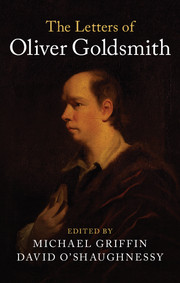61 - To Thomas Cadell, [London, 1773‒1774]
Summary
William Cooke, Goldsmith's friend and chronicler, made the following observation on Goldsmith's methodological approach to history writing:
His manner of compiling this History was as follows: - he first read in a morning, from Hume, Rapin, and sometimes Kennet, as much as he designed for one letter, marking down the passages referred to on a sheet of paper, with remarks, he then … spent the day generally convivially … and when he went up to bed took up his books and paper with him, where he generally wrote the chapter, or the best part of it, before he went to rest. This latter exercise cost him very little trouble, he said; for having all his materials ready for him, he wrote it with as much facility as a common letter.
Goldsmith, working on the second edition of his History of England, indicates in this letter that he read widely and was assiduous in consulting the latest available sources. Frances Brooke (bap. 1724, d. 1789), writer and playwright, was the author of Elements of the History of England from the Invasion of the Romans to the Reign of St George, 4 vols. (London: 1771). This was a translation of Claude-Francois- Xavier Millot's original publication, Élémens de L’Histoire d’Angleterre depuis son Origine sous les Romains jusqu’au Règne de George II (Paris, 1769). It is possible that Goldsmith knew Brooke: she was acquainted with Johnson, and Garrick had rejected a tragedy of hers. Another plausible connection may be through Arthur Murphy and John Boyle, Earl of Cork and Orrery, who contributed to her periodical Old Maid (1755–6).
The copy-text is the manuscript in the Rosenbach of the Free Library of Philadelphia. It was first published by Prior in 1837. It is addressed to ‘Mr. Cadell. | Strand.’ The letter must follow the preceding letter very closely.
Mr. Goldsmith's compliments to Mr. Cadell, begs for an hour or two the use of Millot's History by Mrs. Brooke.
- Type
- Chapter
- Information
- The Letters of Oliver Goldsmith , pp. 133Publisher: Cambridge University PressPrint publication year: 2018



